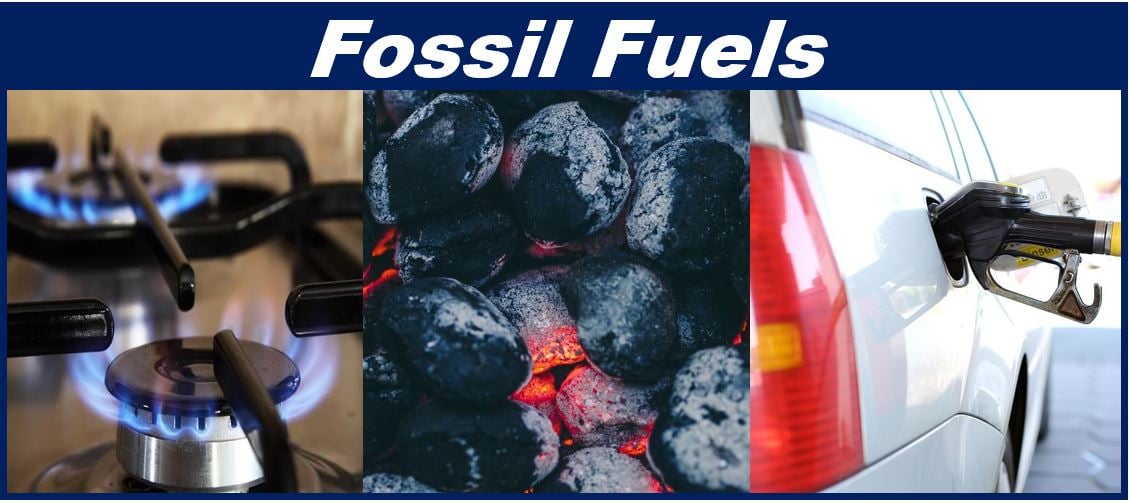Fossil Fuels include natural gas, coal, and crude oil (petroleum). We call them fossil fuels because they are the remains of organisms that were alive a very long time ago, like fossils. All life forms such as animals, plants, fungi, and bacteria are organisms. Put simply; fossil fuels consist of decayed animals and plants.

We have been dependent on fossil fuels as a source of energy for a long time. Today, they provide approximately eighty percent of global energy needs. Energy experts, economists, and environmentalists warn that we must find other sources of energy soon because the supply of oil, gas, and coal is finite, i.e., we will run out of them one day. They are unsustainable energy resources.
Cambridge Dictionary defines a fossil fuel as “fuels, such as gas, coal, and oil, that were formed underground from plant and animal remains millions of years ago”.
The process takes millions of years
It takes several million years for crude oil, natural gas, and coal to develop. Fossil fuels that people, businesses, and other entities use today started to form long before dinosaurs existed.
It will be millions of years in the future before organisms that are alive today turn into fuel that we can use to power our machines, generate electricity, and heat our homes.
Energy from fossil fuels is chemical energy
We call the energy we get from fossil fuels chemical energy, which is produced as a result of combustion, a chemical reaction. When the carbon-carbon and carbon-hydrogen bonds in these fuels break, they release energy.
Crude oil, gas, and coal are hydrocarbons, i.e., they are compounds of hydrogen and carbon. In the presence of oxygen, they can burn, producing heat (energy), water, and carbon dioxide (CO2).
According to Kidzfeed.com:
“Combustion of fossil fuels is a highly exothermic (heat releasing) reaction and produces a huge amount of energy.”
Nonrenewable and renewable energy sources
As mentioned above, fossil fuels are nonrenewable energy sources. Solar energy, on the other hand, is renewable. Solar energy or solar power involves capturing the Sun’s energy and converting it into electricity.
The following are examples of renewable energy sources:
- Solar energy.
- Wind energy – using wind to generate mechanical power or electricity.
- Biomass energy – fuel developed from forest debris, manure, scrap lumber, some crops, and other organic material.
- Geothermal energy – using the Earth’s internal heat to generate electricity or warm up buildings.
- Hydroelectricity – using the energy from moving water to generate electricity.
- Tidal energy – capturing the energy from ocean tides and converting it into electrical energy.
We can also use the terms tidal power, geothermal power, wind power, etc. Renewable energy comes from a source that never ends (on a human timescale). For example, it does not matter how much of the Sun’s energy I capture today or this year, I will still be able to access sunlight tomorrow, next month, next year, etc.
Advancements in technology have significantly increased the efficiency and lowered the cost of renewable energy sources, making them more competitive with traditional fossil fuels.
However, the transition from fossil fuels to renewables also presents challenges, such as the need for new infrastructure and ensuring reliable energy supply during variable weather conditions.
Renewables, fossil fuels, and the environment
All these renewables, except for biomass energy, are environmentally friendly. Environmentally friendly, in this context, means that they do not emit greenhouse gases such as CO2 and methane.
Fossil fuels are not environmentally friendly. Nearly all scientists across the world say that the burning of fossil fuels is causing global warming.
Investing in fossil fuels
According to Mark Carney, former Governor of the Bank of England, over the next few decades, the oil and gas industry will decline while renewables will increase dramatically. Nobody knows exactly how fast each sector will rise or fall.
Mr. Carney says that companies in the financial sector need to curb investment in fossil fuels at a much faster rate. “We are in a climate crisis… action needs to be taken,” he explained.
Investment in solar power globally is greater today than investment in fossil fuel companies.
Video – What are Fossil Fuels?
This video presentation, from our sister channel on YouTube – Marketing Business Network, explains what the meaning of ‘Fossil Fuels’ is using simple and easy-to-understand language and examples.
